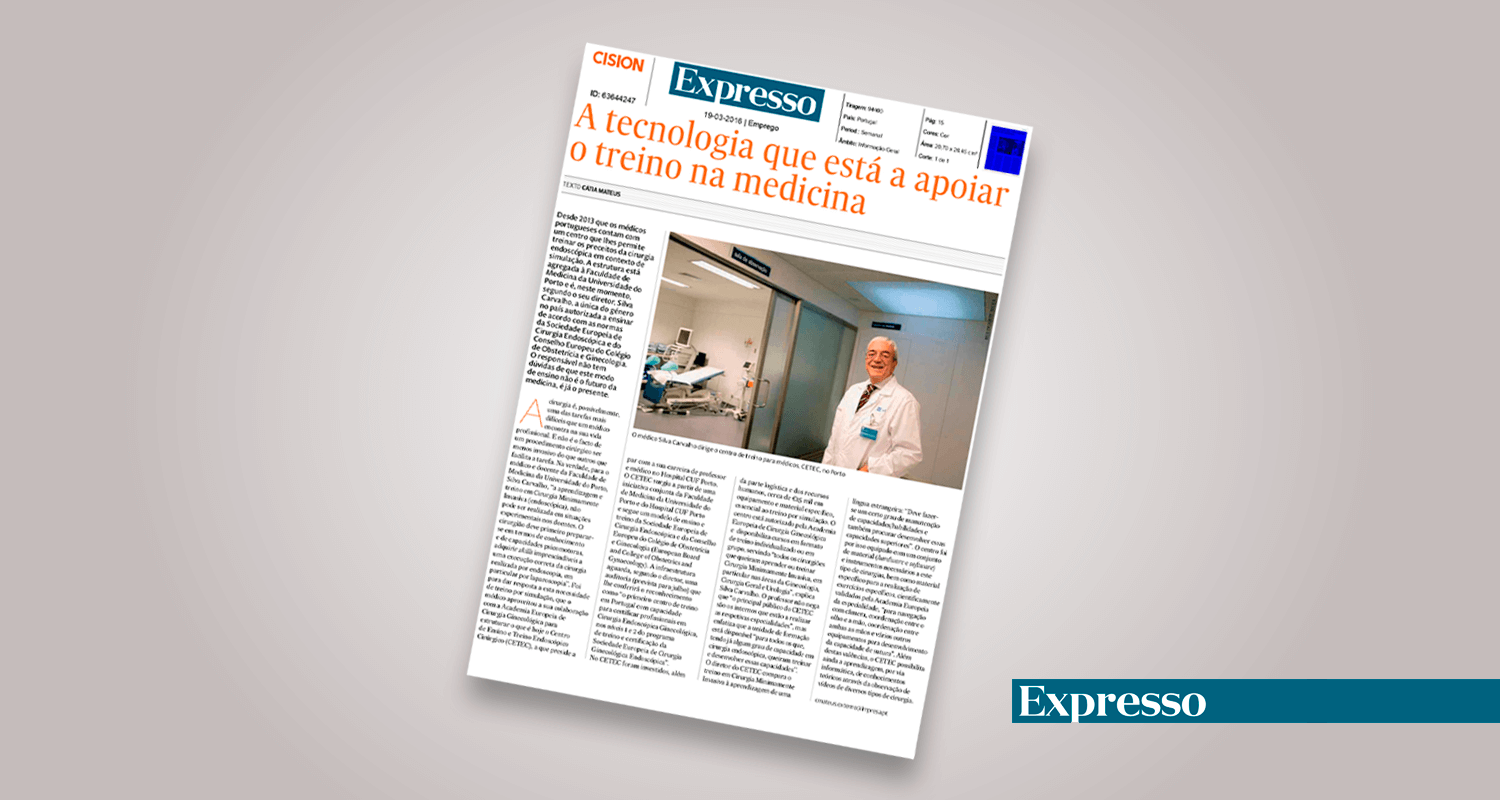
Prof. Dr. João Silva Carvalho featured in the Expresso Newspaper
The technology that is supporting training in medicine was the theme of the interview conducted by Jornal Expresso with Prof. Dr. João Silva Carvalho, director of the Center for Surgical Endoscopic Teaching and Training (CETEC) and CETI – Center for the Study and Treatment of Infertility.
Since 2013, Portuguese doctors have had access to a centre that allows them to train in the precepts of endoscopic surgery in a simulation context. The facility is attached to the Faculty of Medicine of the University of Porto and, according to its director, Silva Carvalho, is currently the only one of its kind in the country authorised to teach in accordance with the standards of the European Society of Endoscopic Surgery and the European Council of the College of Obstetrics and Gynaecology. The director has no doubt that this teaching method is not the future of medicine, it is already the present.
Surgery is possibly one of the most difficult tasks a doctor encounters in his or her professional life. And the fact that a surgical procedure is less invasive than others does not make the task easier. In fact, for the doctor and professor at the Faculty of Medicine of the University of Porto, Silva Carvalho, “learning and training in Minimally Invasive Surgery (endoscopic) cannot be carried out in experimental situations on patients. The surgeon must first prepare himself or herself in terms of knowledge and psychomotor skills, acquiring skills that are essential for the correct execution of surgery performed by endoscopy, particularly laparoscopy”.
It was to respond to this need for simulation training that the doctor took advantage of his collaboration with the European Academy of Gynecological Surgery to structure what is now the Endoscopic Surgical Teaching and Training Center (CETEC), which he presides over alongside his career as a professor and doctor at the CUF Porto Hospital.
CETEC emerged from a joint initiative of the Faculty of Medicine of the University of Porto and the CUF Porto Hospital and follows a teaching and training model of the European Society of Endoscopic Surgery and the European Board and College of Obstetrics and Gynaecology.
According to the director, the infrastructure is awaiting an audit (scheduled for July) that will grant it recognition as “the first training center in Portugal with the capacity to certify professionals in Gynecological Endoscopic Surgery, at levels 1 and 2 of the training and certification program of the European Society of Gynecological Endoscopic Surgery”.
In addition to the logistics and human resources, CETEC invested around €15,000 in specific equipment and materials, essential for simulation training. The center is authorized by the European Academy of Gynecological Surgery and offers courses in individualized or group training formats, serving “all surgeons who want to learn or train in Minimally Invasive Surgery, particularly in the areas of Gynecology, General Surgery and Urology”, explains Silva Carvalho.
The professor does not deny that “CETEC’s main target audience are interns who are completing their respective specialties”, but he emphasizes that the training unit is available “to all those who, already having some degree of capacity in endoscopic surgery, want to train and develop these skills”.
The director of CETEC compares training in Minimally Invasive Surgery to learning a foreign language: “There must be a certain degree of maintenance of skills/abilities and also an attempt to develop these higher skills”.
The center was therefore equipped with a set of material (hardware and software) and instruments necessary for this type of surgery, as well as specific material for carrying out specific exercises, scientifically validated by the European Academy of the specialty, “for navigation with a camera, coordination between the eye and the hand, coordination between both hands and various other equipment for developing suturing skills”.
In addition to these services, CETEC also enables the learning, via computer, of theoretical knowledge by watching videos of different types of surgery.
